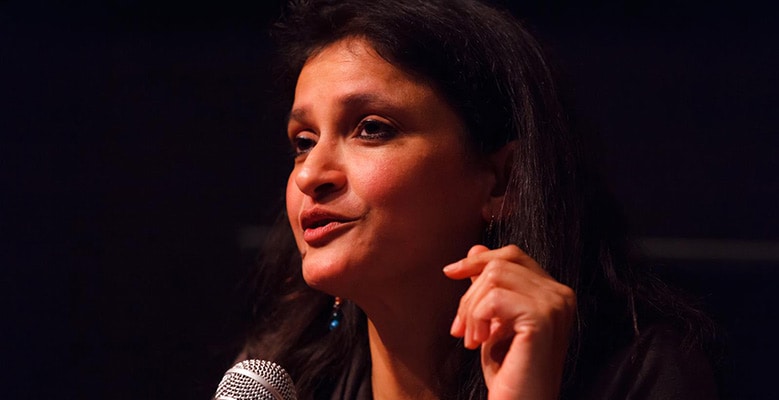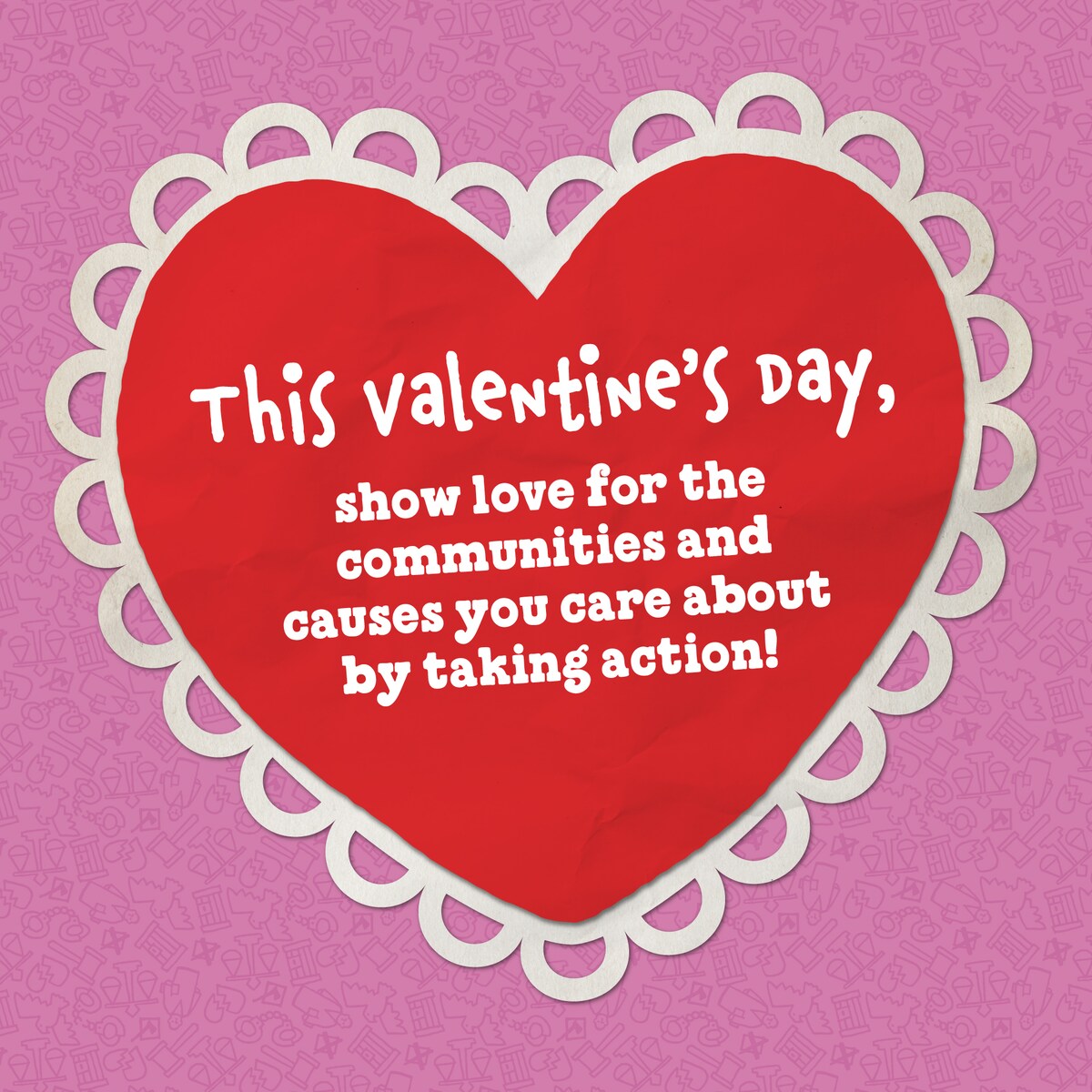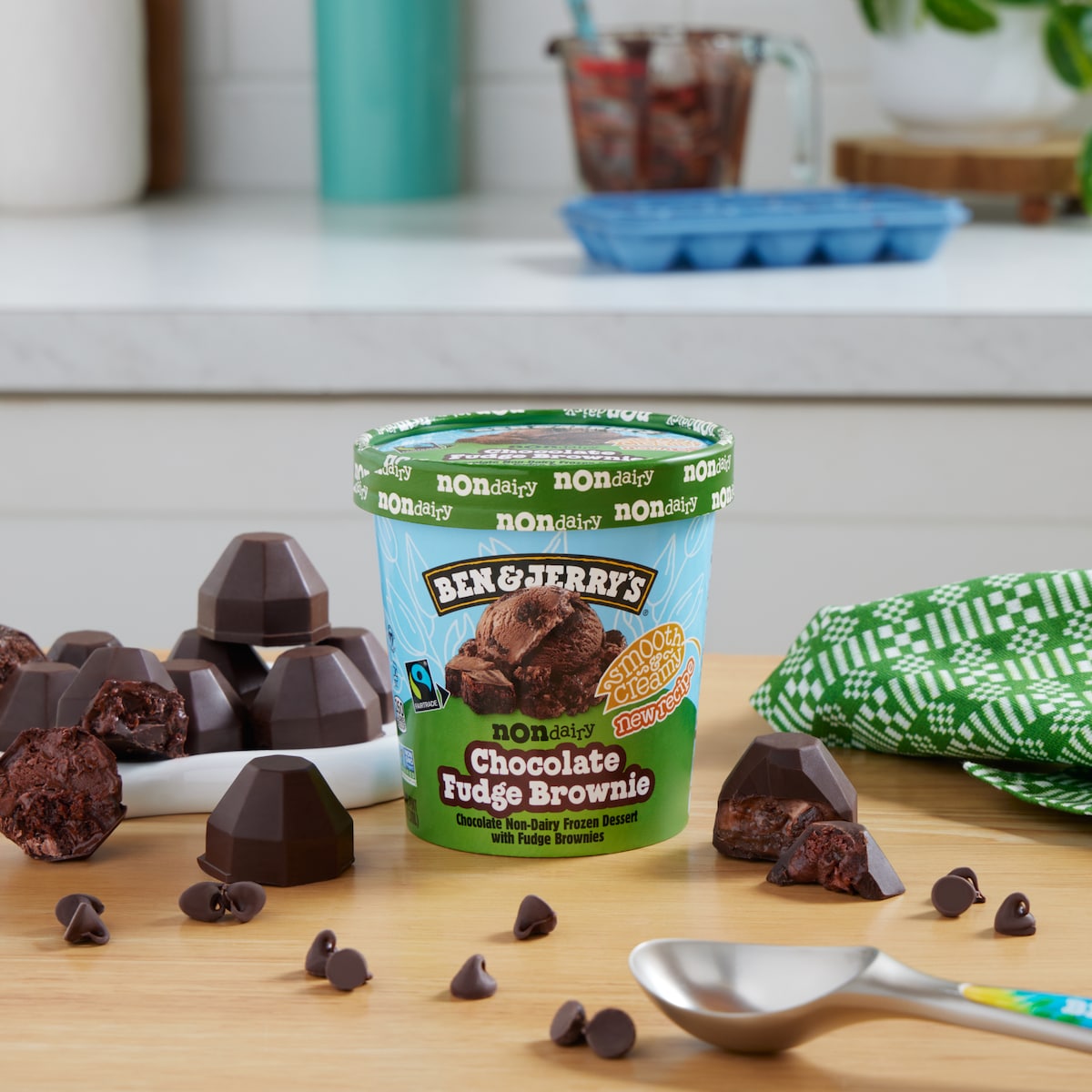
This is the first in a series of pieces profiling members of the Ben & Jerry’s Board of Directors. In honor of International Women’s Day, we’re starting with Board Chair Anuradha Mittal.
One of the joys of working at Ben & Jerry’s is being surrounded by brilliant, passionate people who wake up every day excited to have fun, work hard, and make a difference in the world. So it was a true pleasure when we got the chance to talk to Anuradha Mittal, the chairperson of our independent Board of Directors (and a Ben & Jerry’s Foundation trustee).
Mittal is an internationally recognized expert on development, human rights, and agriculture. She’s the founder and executive director of the Oakland Institute, a progressive policy-oriented think tank dedicated to driving change in areas like the climate crisis, Indigenous land rights, sustainable food systems, and social, racial, and economic equity.
After reading this interview, we’re sure you’ll understand why we feel so lucky to have her on our team.
You have an incredible story. Can you tell us about your childhood in India?
I’m a person who would've never thought that I’d be sitting where I’m sitting today. I was raised in Kanpur, India, one of the most polluted cities in the country and the world. But I had the most beautiful, rich childhood, with three brothers and parents who deeply cared about us. We didn’t have much, but I didn’t realize this when I was growing up—which is how the majority of the world lives.
I remember going to school, working hard to be a good student, aspiring to go to college, making my family proud. When I would see large dams and other mega-projects being built, I would cry with joy because we were taught that would mean development and prosperity for my country and people. I was able to fulfill my dream to go to Delhi University (Indraprastha College for Women), only to learn that much of what I had been taught about development was a lie. I had to unlearn it all.
The Union Carbide poison-gas disaster in 1984 in Bhopal that killed thousands upon thousands of people shocked me. It was a wake up call. The pesticide plant was surrounded by shantytowns, leading to more than 600,000 people being exposed to deadly gas. Volunteering in Bhopal, I saw that the victims were the poorest, the most marginalized. I recognized that there is no equity when it comes to harm and injustice—that when somebody gets rich, somebody else gets poor. So I spent most of my time in college not in the classroom, but outside, organizing.
How did your family react to what you were doing?
My family was upset, largely because they were worried about my safety. They believed that they had sent me to college to study. Also, I quickly learned that you're not supposed to challenge the establishment and those in power. You are not supposed to upset the status quo.
I was naive enough that I thought if I could somehow be a lawyer, or become the chief justice of India, I could change things! But where I come from it was impossible for a girl to become a lawyer, because then nobody would marry her. I didn’t get to be the chief justice, but I never again let anyone tell me what is or isn’t possible for me. I refused to live my life by any standard set by others or by anybody else’s expectations. If I’ve accomplished anything, it’s that I've lived my life my own way.
What did you learn from your activism at college?
That you have to speak truth to power. After the Bhopal disaster, no one was taking responsibility, no one was being held accountable, not the American CEO of Union Carbide, not the Indian government. I was motivated to join student environmental organizations like Kalpavriksha and Bhopal Group for Information and Action (BGIA) to learn, to advocate, to use my voice for justice. Then student members of the BGIA were listed in the media as CIA operatives! Letters were sent to their families to prevent them from demanding justice and holding corporations accountable. I learned that if you stand up against injustice, those benefiting from it will not sit idle—they will retaliate. My purpose in life became to say and stand by the truth.
Eventually you came to the US. Can you talk about that?
I never wanted to leave my country. Remember, I wanted to go to law school and serve on the Supreme Court! It was actually one of the hardest things, but to be able to follow my dreams and do what I wanted to do, I had to leave.
I came to the US as an academic, but I realized that I wanted to do research that had an impact, not just publish books that would be mainly unaffordable by most people. Still an activist, I got involved in global struggles, like the fight against the World Bank’s structural adjustment programs, as well as in local struggles for social and economic human rights in the US. I came to realize that the oppression experienced by Indigenous or urban poor communities in India, Kenya, or Tanzania is built on the same structural foundations of injustice and racism that Indigenous, Black, and Brown people face in the US.
What led you to create the Oakland Institute?
I became interested in think tanks and how they help shape policy. But, at the time it seemed like the space was dominated by these big think tanks based inside the [Washington, DC] beltway. They developed top-down solutions for every problem in the world that they then discussed at conferences in places like Rome, Brussels, or DC—far from impacted people and communities. This disconnect is part of the problem.
Some friends and I decided that there was a need for a progressive think tank, and naming it the Oakland Institute was very deliberate. Oakland—the home of the Black Panthers. Oakland—one of the most ethnically diverse major US cities. Oakland—where more than 112 different languages are spoken. The name itself represented the kind of integrated, holistic approach we’d take to our work.
I never really had a big plan or idea for how it was all going to work out, but since it was founded in 2004, the Oakland Institute has been able to shape some of the key global conversations around food aid, agriculture, land, the environment, and Indigenous rights. For instance, our work has stopped large corporate conglomerates from stealing land from Indigenous communities all over the world. We have challenged powerful actors like the World Bank from imposing ill-conceived policies on countries in the global South. The Oakland Institute’s research, advocacy, and international media coverage has resulted in an amazing string of successes and organizing in the US and abroad.
It’s been a lot of fun. Challenging too, of course. But if it's not challenging and you're not having an impact, then why bother doing it, right?
When, and why, did you join the Ben & Jerry's Board of Directors?
One day in 2007 I got a phone call from somebody who introduced himself as Jeff Furman and said he was from the Ben & Jerry's Board of Directors and that they needed a new board member. I had no idea what he was talking about. I’m an activist. I speak my mind. I was sure it wouldn’t work. But he said, I’ll never forget, "Yeah, I've talked to activists and many other folks, and your name came up often and you are the kind of person we are looking for." So we met a couple of times and I kept saying, "You know it won't ever work." And he was like, "Well, why don't you give it a try for a year?" And that's how it started.
I was sure I wouldn't last. But the board was dealing with a difficult question at the time and I came to Vermont and I fell in love with what Ben & Jerry’s is about. I met folks who had spent over 20 years or so working for this company with passion and pride. I learned that Ben & Jerry's is about people. People who believe in making the world’s finest ice cream, care what goes into making that ice cream, and use this business to speak the truth and help make this world a better place for everyone.
Ben & Jerry’s is a revolution. You have a company that dares to walk the talk—it provides a livable wage to its workers, has a human rights program for farm workers designed by the farm workers, is working on its ingredients supply chain to ensure dignity and decent livelihoods, calls for the dismantling of white supremacy, challenges an unfair criminal legal system and calls to invest in communities, and so much more. And we make the world’s best ice cream with incredible iconic flavors with no palm oil and no GMOs! And we get to do all this cool work with wonderful people who have chosen to work for a better world, not just a corporation.
What qualities or perspectives do you think that you in particular bring to the board?
What I try to bring as a board member is my full self with humility and integrity. It is an honor and a responsibility to work with the Ben & Jerry’s community to ensure and grow the company’s rich legacy as a purpose-led business.
Perhaps my background, both in terms of my experiences growing up and the struggles I have been involved in, are part of what helps me be of service to the company. I have worked for a long time at the nexus of food, agriculture, land rights, and human rights. I bring that experience, and the lessons learned, to the board with the hope that it helps the company continue to operate from a place of integrity, courage, and conviction. Also, as the chair of the board, I get to work alongside incredible fellow board members with amazing and varied life experiences who are tasked to ensure that Ben & Jerry’s stays true to its core values.
Why is it important for a company like Ben & Jerry's to be able to speak that truth to the world?
It is a moral imperative. We are facing the existential threat of the climate crisis. Our world is torn apart by racial injustice and growing social and economic inequities. Violence and war benefit the military-industrial complex while destroying families and forcing people from their homes. Amidst this and more, a business that focuses only on maximizing profits is unsustainable. For a business to be relevant it has to respond to the world we live in. This is why Ben & Jerry's is exemplary—it operates unafraid with values, and yet is a very successful business. I think that’s hopeful. We don’t know better than the others or have all the answers, but we know we have to do everything we can to build a better, just, and sustainable world. Not just for ourselves, but for future generations. Imagine if every business, every corporation were doing what Ben & Jerry's does. Maybe we wouldn't be living in the mess that we’re in! We can dare to imagine a different world. We can dare to make it happen.
How do you find the courage to act out of conviction when there's so often so much pressure to do the easier thing, to simply maintain the status quo?
The job description of the independent board of Ben and Jerry's is very clear. And if any of us is afraid to carry it out, we shouldn't be on the board. The pressure comes as part of the job description, as part of the responsibility. I take my responsibility as a board member, as board chair, very seriously. It isn’t always easy, but if I was looking for an easy ride, I would go do something else.
Silence makes us complicit. I always remind myself of that. I think of the people I knew growing up. I think of the people I work with, the Indigenous leaders, the land defenders who face criminalization, arrests, and even assassinations. They refuse to give up. I have heard them say so many times, “I was born here and I will die here. I'll fight for my land rights. This is my land.” Who am I to say this fight is too hard or that we should give up? Sometimes we have to make tough decisions, yes. But compared to what people on the front lines face, our discomfort is nothing.
You talked earlier about your childhood, about how your parents didn’t want you to be an activist, about what society thought of women studying law. What advice can you give to young women now who might run into that kind of opposition at home or in the world?
As a mother to a 14-year-old daughter I tell her and other young women that every freaking glass ceiling was made to be shattered. We alone own our destiny. Don't let anyone tell you never. Everything is possible. Trust yourself.
Life offers opportunities for all of us to rise up and do something different, beautiful, hopeful. To be unafraid. This life is beautiful—and it‘s one hell of a ride. Live it. Enjoy it.


